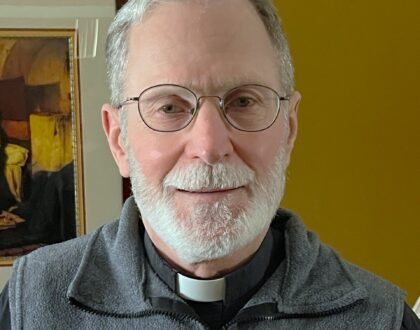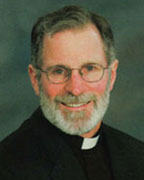Homily, February 25, 2024

From The Pastor
The Lenten season, in both broad and specific ways, tells the story of our redemption. Inclusive of the readings of Holy Week and the Easter vigil, the saving work of God is revealed. Broadly, the movements include disobedience-obedience, sacrifice, and blessing. After the disobedience of Adam and Eve in the garden in the desire to be like God, God calls for an obedience of faith that becomes the pattern of our redemption. The obedience of faith matures through surrendering-sacrifice that receives the promise of great blessing.
Today’s reading of Abraham and Isaac is a specific example. Abraham is the first individual God calls to a personal faith. Accepting the invitation to faith, Abraham serves to further God’s long plan of human redemption. The story is a harsh one. Emotionally, our attention is drawn to Isaac whom God calls Abraham to offer in sacrifice. However, it is Abraham who is the primary character in the scene. The sacrifice of Isaac is clearly a pre-figurement of Christ who would become the ultimate sacrifice of our redemption. Notice the action and its intent.
God puts Abraham to the test. What is the test and what does it mean? The test is one of faith and trust in God through obedient surrender to a radical sacrifice. Will Abraham trust God with his only son whom he deeply loves only to surrender him in sacrifice? This is the test. Will Abraham obey God and surrender his son as an offering to God. The stakes could not be higher. Abraham obeys God and Isaac allows himself to be tied and placed on the altar. In the act of offering his son, Abraham is also offering himself.
Obedient surrender to sacrifice becomes the action of reconciliation that restores our relationship with God. Knowing the torturous surrender Abraham makes, at the last moment God sends a messenger to stop the bloodshed. The action of Abraham mirrors the action of the Father and His beloved Son Jesus whom he did not rescue at the last possible moment. To be clear, God did not force Jesus to die on the Cross. The action of the Cross is redemptive because Jesus, in obedient surrender, freely, willingly, and without resentment accepts the sacrifice of the Cross for our salvation.
The larger theology of a blood sacrifice initiated by God in previous covenant making is beyond our scope here. Blood represents life, and a blood offering is the strongest expression of commitment to the terms of the covenant. God never asks for human sacrifice. People offer a lifegiving resource to God in bulls, goats, lambs, or turtle doves.
The point of the Abraham story is the model of obedient surrender ultimately fulfilled in the surrender of the Divine Son whose blood is a sacrifice of pure love. The perfect surrender of the Father’s love through the surrender of the Son’s willing sacrifice serves as our redemption. As promised in last Sunday’s reading, after the great flood and the faith of Noah, God promised to never again destroy what he had created. God himself in surrendered love sacrificed his only Beloved Son for our sake of our redemption.
This is beautifully expressed in the second reading. The life, death, and Resurrection of Jesus changes the meaning, nature, and goal of our existence. Sin creates division, separation, fear, and often a dog-eat-dog mentality in human beings. Shame and guilt builds, blocking the grace of love. In the old covenant, the sacrifice of bulls, goats, and lambs atoned for sin. Life was offered as a sacrifice and expression of sorrow for sin in the desire for a restored covenant with God. This type of sacrifice for covenant making had its merits but could not reunite humanity to God in a communion of love.
Sin was too strong against Evil’s deception and human weakness. God in Christ is the only worthy and ultimate sacrifice of Divine healing that restores union between God and humanity. Bulls, goats, and lambs could only be a symbolic expression. The dying and rising of Jesus is not a symbol. It is a real, living, unbreakable reality accomplished in the purity of Divine love. God’s blood, God’s life in the Divine Son surrendered to death gives new life. More than a debt paid by a generous benefactor, our redemption is a pure, freely given gift of love. As the essence of love, God could not deny his own creation.
Who then can bring a charge against us? God who has given his very self for the sake of our union with Him. Any further sin will never require a greater sacrifice, for the one true sacrifice is now given in the Lord Jesus. To accept this gift and its eternal promise there can be no further condemnation. We are acquitted by the precious Blood of the Lamb of God.
The table of the Eucharist is where this living sacrifice is offered to sustain us in its promise. The Holy Eucharist is a living sacrifice that nourishes our eternal salvation. The Eucharist is real. It is the Body and Blood of Jesus who died and who is now risen from the dead. Sin is dead. Love wins. Live it.
Father John Esper
Recent Sermons

Homily, March 30, 2025
March 27, 2025

Homily, March 23, 2025
March 20, 2025

Homily, March 16, 2025
March 11, 2025

